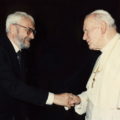I return to the US, my putative homeland, at least once a year, and even when not there, I (like most of the world) have constant access to American culture via movies, TV shows, and websites. In spite of all this, I feel ever more a stranger when I land there. I can’t put my finger on why. Have I become more European? (Whatever that means.) I don’t feel European, or Italian, but lately I don’t feel particularly American either.
Perhaps I’ve become unaccustomed to some of America’s standard features, such as the plethora of churches – in many states juxtaposed with huge store signs advertising guns.
Guns, yes, that’s a factor. America feels less safe to me than Europe. One big reason is that there are far more guns around in the US, waiting to be snatched up and fired in a moment of rage. I have often thought, at times when I’m almost mad enough to throw dishes, that if there was a gun to hand, I’d be at risk of using it. So I’m glad there aren’t any in our house, and I prefer to stay away from guns altogether – I don’t trust myself with them, let alone anybody else.
Are Americans inherently more violent, with or without guns? On our way back from North Carolina, Susan and I were very irritated, even worried, by a pickup truck that hugged our bumper in fast, heavy highway traffic. I turned around and made a pushing-back motion with my hands, trying to indicate to the driver that he should give us more room. Susan snatched my hands down, saying: “Don’t do that. You never know, here.” (Susan lives in Abu Dhabi, and says it’s the safest place she’s ever lived.) I do exactly this in Italy, and it never occurred to me that anyone might consider it a shooting offense.
Reflect on the recent confrontation, at a children’s baseball game, between all four grandparents and the father of a boy at the center of an ugly custody dispute, reported thus in the local paper:
“[The maternal grandmother], Patricia Noe… may have sparked the confrontation when she said something to Jerry Shands [the father] and pointed an umbrella at him, the district attorney said.
"Then, of course, he says, ‘Get that blankety-blank thing out of my face.’ … And the next thing you hear is pop, pop, pop (from Samuel Noe’s gun)."
Three people dead, one critically injured, and the boy himself a witness. Which begs the question: Who the hell goes armed to a kids’ baseball game? And in how many parts of America is it legal to do so? I don’t want to live in any place where an angry grandpa can just whip out a gun and start shooting – because, god knows, we wouldn’t want to infringe on his right to bear arms and protect his grandson from a bad umpire call!
Yet Americans seem to take this potential for violence for granted. Reporting on this week’s “incident” in a Colorado school, the New York Times says: “Gov. Bill Owens, who visited the school and the church Thursday afternoon, said he thought school security improvements made in Bailey after the 1999 attack at Columbine High School in nearby Littleton had probably kept Wednesday’s attack from being worse. The school was built with evacuation fully in mind, including a system that allowed students in adjoining classrooms to escape quickly…”
Huh? Schools are now being built with evacuation in mind? I already knew that in some districts people have to go through metal detectors to get into a school in the first place, but – evacuation? And we’re not talking about al Qaeda here – the danger is from ordinary American citizens, including the schoolkids themselves.
What kind of society is America’s that kids have to spend their school days under the assumption that at any moment they could be rounded up and shot? Is that how we want American children to be growing up? How can such an atmosphere produce psychologically healthy citizens? It’s not videogames that inure kids to violence: it’s what they see every day on the news and in their daily lives!
What could have stopped this week’s tragedy would have been to ensure that some random guy who didn’t even have a home address did NOT HAVE A GUN. How could he have legally bought it if there’s no address to do a background check on him? If he got it illegally, why was that allowed to happen?
What makes America even scarier is that the violence is not on the surface. Everyone we meet in America seems so nice, especially anyone in a customer service position (truly startling when you’re accustomed to the indifferent or downright hostile service culture of most European establishments). Yet, given the number of deaths, you have to wonder: how many of these nice people are ready to explode? And will find a weapon ready to hand when they do?
What are your thoughts?








